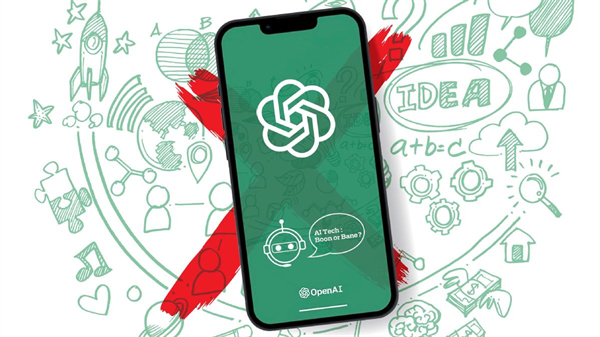
- Home
- Media Center
-
Events
- Wuzhen Summit
- Regional Forums
- Practice Cases of Jointly Building a Community with a Shared Future in Cyberspace
- World Internet Conference Awards for Pioneering Science and Technology
- The Light of Internet Expo
- Straight to Wuzhen Competition
- Global Youth Leadership Program
- WIC Distinguished Contribution Award
- Membership
- Research & Cooperation
- Digital Academy
-
Reports
- Collection of cases on Jointly Building a Community with a Shared Future in Cyberspace
- Collection of Shortlisted Achievements of World Internet Conference Awards for Pioneering Science and Technology
- Reports on Artificial Intelligence
- Reports on Cross—Border E—Commerce
- Reports on Data
- Outcomes of Think Tank Cooperation Program
- Series on Sovereignty in Cyberspace Theory and Practice
- Other Achievements
- About WIC
- 中文 | EN

ChatGPT isn't an enemy, but a partner
The world's latest technology sensation seems to be a threat to the human workforce, but it may still be a long way off before this could become a reality. Wang Yuke reports from Hong Kong.

"First love, it's a flame that never dies. A memory that lingers on in my heart and mind. First love, it's a moment I'll always treasure. With a smile that shines and a love that'll last forever …"
You may assume they're just saccharine lyrics bobbing and flowing on the giddily catchy chord progressions laced with a string of cheery melodies. But, you would be dead wrong if you were to think it's the brainchild of a human artist by default. In fact, it's a masterpiece by ChatGPT (Chat Generative Pre-trained Transformer) — an intelligent chatbot created on large language models and a product of generative artificial intelligence.
Hong Kong's first GPT-assisted music single, First Love, by independent music platform Jamintheroom Entertainment, debuted in April. Adam Tam, the record producer, without feeling even a bit menaced by ChatGPT's music genius, says ChatGPT's emergence only amplifies the importance of human involvement in music composition or, precisely, the emotional embellishment that can only be fulfilled by human artists.
"Music improvisation is an experience-based affair, and a song without emotional heft can hardly be heart-stirring," he says.
ChatGPT — the latest technology sensation with its astonishingly versatile capability of performing jobs on instructions — has set tongues wagging and touched billions of hearts around the world.
Its "wow" effect aside, the advent of ChatGPT has sparked fears among all walks of life that the chatbot, or other AI technologies, would make humans redundant in the workforce. While occupations that tend to be "menial" and "repetitive" may well be among the first to be relegated to obscurity, it could still be a long way off before ChatGPT could replace professionals in creative industries, only because it has no emotional intelligence and intuition — the very basis for arts to electrify the audience and strike an emotional chord.
The chords rendered by ChatGPT are merely the backbone, or structure, of the piece of music. "It can't stand without human engagement, such as modifying the tempo, tinkering with the dynamics, refining the lyrics, choosing the most suitable instrument for the desired mood, and adding a vocal touch in the final recording," explains Tam.
The human voice texture and all the emotionally charged finishing touches by the human artist are essential meat for the GPT-generated chords' "skeleton", says Edward Sung, founding director of Jamintheroom. ChatGPT masquerades as an entity with the soul and emotions, but it's actually a faux emotion, thanks to "social programming", argues Sung, referring to the sociological process of making individuals to respond in a manner widely approved by society. "Arts is a personal venture that only comes alive with an individualized firsthand element," he says.

The World Internet Conference (WIC) was established as an international organization on July 12, 2022, headquartered in Beijing, China. It was jointly initiated by Global System for Mobile Communication Association (GSMA), National Computer Network Emergency Response Technical Team/Coordination Center of China (CNCERT), China Internet Network Information Center (CNNIC), Alibaba Group, Tencent, and Zhijiang Lab.





